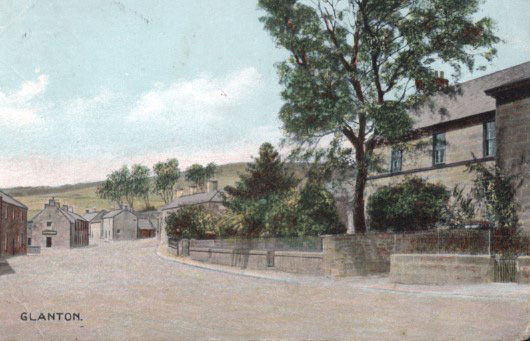Life and Crimes in Glanton in 1800s
When I lived in Whittingham in the early 1970,s there was a knock on my door. It was the local policeman. Someone had reported me acting suspiciously in Hepscott that afternoon and he wanted to know why. I explained that I was a valuation surveyor and had been looking for comparisons in the area. I showed him my identity documents which satisfied him, that whilst I may look a suspicious character, I was on legitimate business.The policeman and I became good friends.
The Magistrates Court in Whittingham had been closed some years earlier and he asked me if I would like to see the cells. They were very Dickensian and Spartan with vaulted roof and thick studded wooden doors. He thought it would be a good idea to lock me up, just for a few minutes, but that was enough for me to know that to be locked up for any length of time would not be a pleasant experience; but I am able to make the claim that I was he last person to be locked up in Whittingham jail. However you may know better!! While I was there he opened a cupboard which was full of record books detailing the cases which had taken place in the long and distant past. One in particular caught my eye. It was a case where the prisoner had killed someone, which was a capital offence, but it seemed obvious to me, rather than send him to the gallows, the magistrates looked for a reason to save his life and declared him insane thus preserving him. This whetted my appetite to know more and I thought one day I would try and find out more.
Nearly forty years latter I traced the books to the County Archive at
Woodhorn Colliery and I recently spent a day looking at 1859-1863.
I restricted myself, more or less, to the residents of Glanton. Most of the offences related to Master and Servant cases where the servant sued the Master for wages. Others were for “Bastardy”, Poaching, Assault
and Turnpike Licences and Offences. “Bastardy” was the rather harsh term they used to describe cases where unmarried women sued for maintenance of the child. What struck me was that there were many of these cases. In only one case did the man involved deny paternity. The rate seems to have been 1 shilling and 6 pence per week. It was a kind of Child Support Agency but more effective.The Magistrates also handed out Parking fines for illegal parking of carts and in one case someone was fined for not being in control of his cart on a turnpike he being some 200 yds distant. In another case, someone was fined for being asleep in charge of a horse on the wrong side of the turnpike.
A certain Mark Campbell of Glanton seems to have been a serial offender:
9th August 1858 he assaulted George Thompson of Powburn, fined 10/- & £1-1-0 costs or 1 calendar month in Alnwick House of Correction.
8th. August 1861, left three carts on the highway at Glanton and obstructed passage.
14thJuly 1862 drunk and riotous in a public thoroughfare at Whittingham.
29th April 1863 fined for leaving a cart on the highway
15th.August 1860 Andrew Taylor, a former policeman from Newcastle, tried to pass a forged £5 note in a public house in Glanton. The note though looking like a Bank of England note was headed “Bank of Engraving” instead of Bank of England. He was committed for trial.
Only minor cases were tried at the Petty Sessions at Whittingham, more serious crimes were dealt with at the quarter sessions or the assizes. The first serious case I came across had nothing to do with Glanton but I have the feeling that it was a sad case rather than an evil crime and think that it is worth mentioning. It concerned Ann Millican from Cross Hill, Callaly. She was a widow and was committed for trial at the assizes for endeavouring to conceal the body of her child on the 5th July 1859, by burying the dead body in a quantity of coals.
On the 28th January 1861 John Bury of Glanton Pike was brought before the court for Bestiality and on the 1st September Jane Palmer accused John Dewar of Alnwick of rape. If he were charged it would have been a capital offence which could only be tried at the assizes. If it was proved to be attempted rape it could then be tried at the quarter sessions. What happened in these 3 cases I do not know but I will try and find out .If I succeed I will let you know.
Mike Mason
Chairman
Glanton Heritage Group

